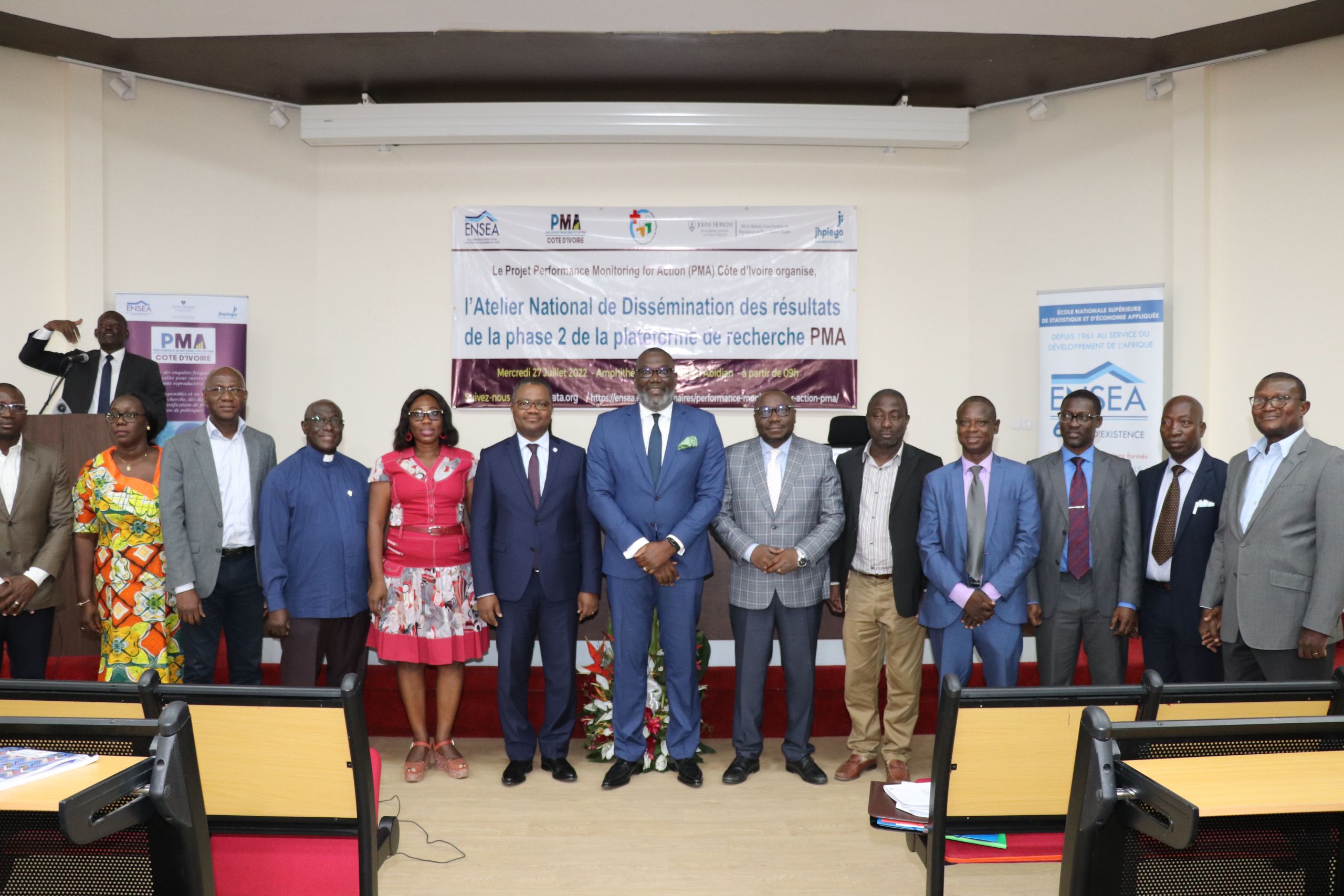
The Performance Monitoring for Action (PMA) Côte d’Ivoire presented the results and recommendations from phase 2 of the project at a National Dissemination Workshop on Wednesday 27 July 2022 at ENSEA in Abidjan.
The official opening of this workshop was made by the Director General of Health, Professor Mamadou SAMBA. He was joined by the Country Director of JHPIEGO, Dr. KIYALI OUATTARA and the Director of ENSEA Abidjan, Dr. Hugues KOUADIO, who is also the Coordinator of the PMA CI project.
Opening the series of speeches, Dr. Hugues KOUADIO welcomed his guests, then set the context of the Performance Monitoring for Action (PMA) Côte d’Ivoire research project before praising the work of the research team. He also thanked the technical and financial partners for their various supports.
As for Dr. Kiyali OUATTARA, he urged the stakeholders to make good use of the data collected and hoped that they could help in decision-making at the level of reproductive health and maternal and child health actors.
Representing the Ministry of Health, Professor Mamadou SAMBA congratulated PMA CI for this revolutionary platform for making regular data available and invited the project team to quickly disseminate the results of phase 2 to the health actors, who are the first to be concerned and the first to benefit from these results.
The implementation of the project in Côte d’Ivoire required a first series of data collection operations (baseline survey) which took place throughout the country between September and November 2020. A second series of data collection operations took place between September and December 2021. These operations made it possible to obtain information from women aged 15-49 on the demand for and use of contraceptive methods and on contraceptive dynamics, and to obtain information on the supply and quality of services from the health facilities serving the areas covered by the study. The study also made it possible to generate quantitative data on gender-based violence within households. With a view to popularizing the results of these surveys, a national dissemination workshop was held on Wednesday 27 July 2022 at ENSEA. In order to have a large coverage of the different actors during this dissemination, this workshop was held in hybrid (face-to-face and online on Zoom).
The general objective of this workshop was to present the main results of phase 2 of the project and of the module on gender-based violence, and also to encourage greater
appropriation of the survey data at the national level. It was attended by
– the Ivorian government represented by the Director General of Health
– Decision-makers in the field of family planning and reproductive health
– Development partners
– experts from the scientific community and civil society
– and finally the members of the Consultative Monitoring Committee (CMC)
Among the results presented, it should be noted that
The modern contraceptive prevalence rate (mCPR) among women in union increased from 19% in 2017 to 26% in 2021.
A continued decline in unmet need from 26% in 2017 to 18% in 2021.
An increase in unintended pregnancies from 38% in 2020 to 43% in 2021.
Among women using a modern method at the time of the survey, 68% have discussed the decision to delay or avoid pregnancy with their partner.
46% of family planning clients say that most people in their community think that women are not treated with respect in health facilities.
Only one in five women receive the four key messages that constitute quality FP counseling, and 10% of women said they felt pressured by the provider to use the method preferred by the provider.
46% of FP clients report that they do not have access to affordable FP in health facilities.
More than one in five women aged 20-24 discussed FP with a provider in the 12 months prior to the survey. However, adolescent girls are half as likely to have had these discussions.
Nearly one-third of health delivery sites (HDS) offering the implant do not have trained providers and/or the equipment needed to insert and remove the implant. This is also the case for 38% of IUD HPSs.
54% of public provider sites and 40% in private provider sites experienced stock-outs due to non-delivery of orders.
The prevalence of physical and/or sexual violence suffered by women from their intimate partners is significant (14%), thus impacting their development and choices.
Furthermore, only 20% of women who have experienced sexual violence have sought help and in only 2% of cases did they do so through a formal structure.
Physical and/or sexual violence perpetrated by an intimate partner is more frequent among adolescent girls (15-19 years, 21%).
The following recommendations emerge from these results:
Recommendations related to family planning
- Strengthen the awareness of couples by emphasizing to men the value of FP for the well-being of the family.
- Strengthen or adapt the content and approaches of awareness raising.
- Organise campaigns on humanisation, quality of services for providers and respect for clients’ rights.
- Review person-centered counseling approaches.
- Strengthen providers’ capacity in counseling.
- Communicate through all channels (television, radio, social networks) the prices of contraceptive products with the Ministry of Health logo.
- Advocate for free contraceptive products.
- Strengthen the capacities of providers in offering RH services adapted to the needs of adolescents and young people.
- Popularize e-health platforms to inform adolescents and young people about family planning
- Adopt a law allowing providers to supply contraceptive methods to adolescents.
- Strengthen the capacities of providers on site through mobile clinics.
- Make the necessary materials available at all sites.
- Monitor orders and supplies.
- Advocate for an increase in the state’s contribution to the supply of contraceptive products.
Recommendations related to gender-based violence (GBV)
- Increase the dissemination of repressive laws on GBV.
- Raise awareness among communities on the importance of reporting GBV and the various means of redress.
- Strengthen awareness campaigns on GBV.
- Raise awareness among couples on how to manage domestic conflicts.
- Build the capacities of leaders and adolescent girls to avoid early marriages.
All these results and the previous phases of the PMA survey are available on available on the website www.pmadata.org

